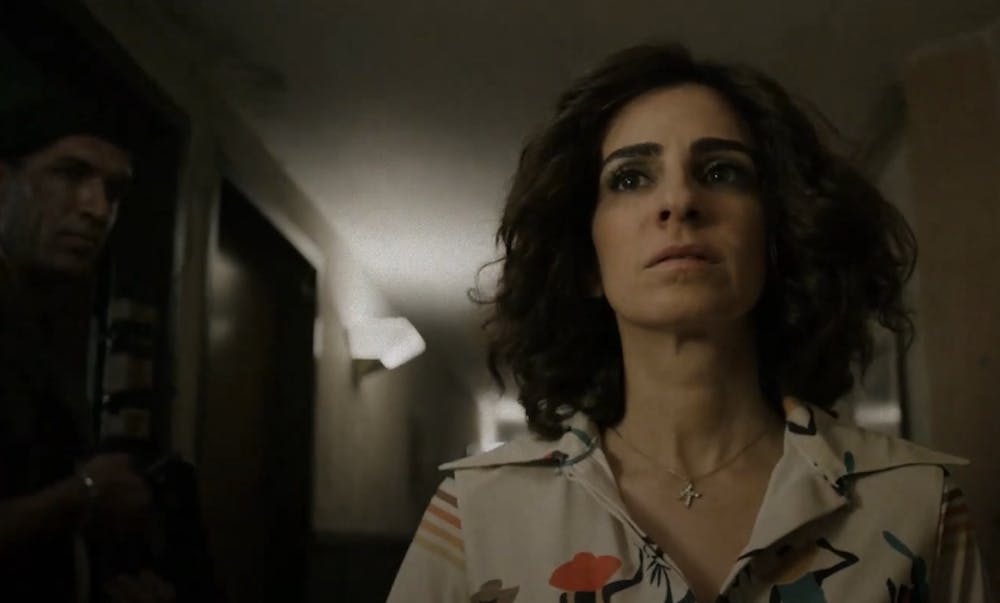On Sunday, Nov. 12, the Rubenstein Arts Center (the Ruby) held a showing of the award-winning Israeli hybrid documentary, fiction-docu film “Savoy.” Written and directed by Zohar Wagner, “Savoy'' was presented at the Ruby as part of their Israeli-docu series.
The 2022 production tells the story of the 1975 attack on Savoy Hotel in Tel Aviv, a devastating assault carried out by the Palestinian Liberation Organization (PLO), which sought the release of Palestinian prisoners held by Israel. Initially, the plan was to attack against the Israeli tourist city of Nahariya, yet the team was unable to locate the city on the night of a previous attempt, two months earlier. When they were spotted by authorities on the coast of Tel Aviv, the PLO made the impromptu decision to overrun the Savoy hotel, the only lit building on the street. Though the attack was a significant event in Israel’s history, having resulted in the death of 18 individuals, one may be curious as to why Wagner felt inclined to tell a story so far buried in the past. More likely than not, her purpose was to bring attention to the courageous and sadly forgotten story of Kochava Levy (played by Dana Ivgy).
Notably, over the course of the film, we get to watch as Levy, a 31-year-old, timid, and deeply unsettled housewife, transform into a fearless heroine. She relies on her proficiency in Arabic to plead to the PLO that they show mercy on her companions, and at one point successfully negotiates the release of an injured hostage, saving his life. However, despite this, her heroic role was overshadowed by a Time Magazine report that incorrectly labeled her as a prostitute. This tarnished her reputation to the point where very few people in Israel even know the name Kochava Levy. “Savoy” is likely Zohar Wagner’s attempt to change that.
In “Savoy,” Wagner’s background as both a director and a journalist shines through. She employs a unique style of storytelling: a dual narrative, consisting of reenacted scenes that feature Levy’s interactions with the PLO side by side with newly released archival footage. Despite the unique style, the film is certainly not without its flaws. In fact, it it is likely that if either component had been left out, the final product would not have come close to what it ultimately was. Ivgy’s narration as Levy often feels clunky and unnatural. And for a story about a hostage siege, I would not label the film exhilarating nor should it be considered an enthralling spectacle or masterpiece in cinematography.
Nonetheless, what Wagner achieves from a storytelling perspective may be far more significant. For starters, the inclusion of archival footage – which had been concealed for roughly 50 years prior to the release of “Savoy” – is nothing short of extraordinary. We are able to watch real IDF soldiers racing to the sight of the attack, civilians seeking refuge from danger and hostages held captive on the hotel’s rooftop. Wagner’s ability to intertwine such footage with the fictitious plotline is also deserving of acclaim. At one point, the actress who plays Levy prepares to deliver a speech to the Israeli authorities, as demanded by her captors. But instead of relying on a reenactment, Wagner seamlessly transitions back to the archival footage and uses an authentic recording of Kochava Levy delivering that precise speech. Such techniques help create an utterly raw and powerful viewing experience. And while we shall of course never know the feeling of being in Tel Aviv on Mar. 5, 1975, Wagner produces likely the most authentic experience that may be achieved through film alone.
But above all, Wagner develops a narrative that leaves the audience with a rare, hopeful message. Namely, much of the film’s narrative surrounds the unlikely bond Levy strikes up with one of her captors (played by Ala Dakka).
As a young woman, Kochava Levy left a low-income neighborhood to live on a kibbutz, a collective community that shares elements with utopian socialism. Levy has never quite fully at home, and neither her husband, children, or nation have provided her with the sense of belonging she so desperately yearns for. Then there is her Palestinian captor (whose name is not indicated), who has been raised to hate Jewish people all his life.
He and Levy though find comfort in each other's company, which serves as an escape from the impending terror and the imminent fear of death. Of course, nothing long-term was to come out of a few brief intimate moments, but the message Wagner sends is far greater. As Wagner crafts a relationship built on mutual understanding rather than antagonism, she successfully humanizes both parties. At the same, she suggests that suffering, pain and confusion are not exclusive to either side of the conflict.
Today, as fighting in the Middle East persists with no clear end in sight, our population at home remains divided. Now, I do not intend to suggest that "Savoy", which had under 100 attendees at its Nov. 12 showing at the Ruby, is the uniting force that will bring us back together. However, what the film does do so beautifully is humanize both sides of the conflict. And as we try our best to move forward, as hard as it is, I think we all may agree that looking at people as human beings and not as numbers is essential.
Get The Chronicle straight to your inbox
Signup for our weekly newsletter. Cancel at any time.

